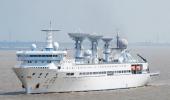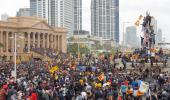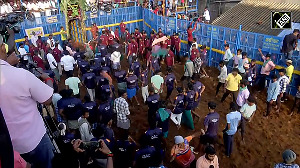Sri Lanka's unprecedented anti-government protests that removed the influential Rajapaksa family from power for mishandling the country's worst economic crisis formally ended after 123 days on Tuesday, even as the demonstrators vowed that their campaign for a "system change" would continue.

The protesters left the main anti-government protest camp at Galle Face promenade where they had been staging sit-ins since April 9, branding it as the ‘Gota go home village' (Rajapaksa go home).
“We have collectively decided to quit the Galle Face site today. It does not mean that our struggle has ended," said Manoj Nanayakkara, a spokesman for the group.
“We press for ending the state of emergency, a fresh parliamentary election and an end to the presidential system," said Koswatte Mahanama, a young monk.
“Our campaign for a system change would continue, although we ended our campaign here at this site," said another activist Vidarshana Kannangara.
The protesters came under pressure to quit the site after former prime minister Ranil Wickremesinghe was elected as the new president. After the appointment of Wickremesinghe as Rajapaksa's successor, the protesters were forcibly evicted from the presidential secretariat and the gate on July 22, drawing widespread international condemnation.
A spate of arrests of activists has raised concern with the main Opposition and rights groups who have labelled the arrests as “State repression”.
The government defended the arrests, saying all those who were arrested either defied court orders or had forcibly entered the State buildings.
The police last week asked the protesters to leave the Galle Face site by August 5, but they defied the order and filed writ applications in the appeal court, claiming their right to protest.
However, when the protesters quit the Galle Face site it was announced that they had withdrawn the writ applications. The street protests already culminated last month.
Protesters in March began demonstrating against the powerful Rajapaksas and demanded the resignation of the entire family.
The massive protests led to the resignation of then-Prime Minister Mahinda Rajapaksa on May 9, and his brother, President Gotabaya Rajapaksa, who fled the country to the Maldives on July 13 and resigned the following day from Singapore after demonstrators stormed his official home and occupied several key government buildings.
Sri Lanka's former finance minister and younger brother of Gotabaya, Basil Rajapaksa, a US passport holder, resigned as the finance minister in early April as street protests intensified against shortages of fuel, food and other necessities and quit his seat in parliament in June.
Protesters have accused the Rajapaksa family, which has dominated Sri Lanka's political scene for nearly two decades, of plunging the country into the worst economic crisis since the country's independence in 1948 through mismanagement and corruption.
Sri Lanka, a country of 22 million people, is under the grip of an unprecedented economic turmoil, the worst in seven decades, leaving millions struggling to buy food, medicine, fuel and other essentials.
The country, with an acute foreign currency crisis that resulted in foreign debt default, had announced in April that it is suspending nearly $7 billion foreign debt repayment due for this year out of about $25 billion due through 2026.
Sri Lanka's total foreign debt stands at $51 billion.
The United Nations has warned that 5.7 million people “require immediate humanitarian assistance,” with Sri Lankans experiencing extreme shortages of essentials including food, fuel and medicines.
The new Sri Lankan government faces the task of leading the country out of its economic collapse and restoring order.
Sri Lanka has seen months of mass unrest over the worst economic crisis, with the government declaring bankruptcy in mid-April by refusing to honour its international debt.











 © 2025 Rediff.com -
© 2025 Rediff.com -